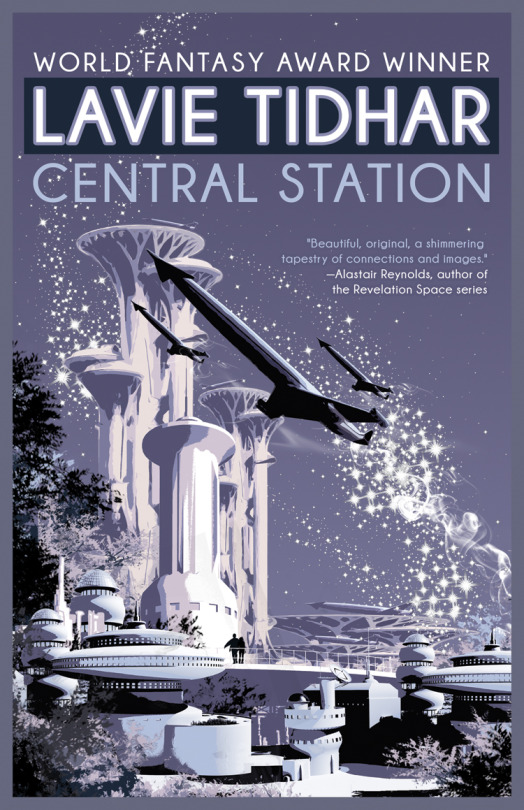The mindbending CENTRAL STATION is breathtaking
A pair of reviews for the wonderful CENTRAL STATION.

BOOKANEER lavishes the book with praise.
CENTRAL STATION is one of the most breathtakingly, bewilderingly, mindbendingly imaginative stories I’ve read in some time. In terms of sheer breadth and volume of ideas, it reminds me of Hannu Rajaniemi, but Tidhar’s style is far more lyrical and dreamlike.
<snip>
CENTRAL STATION is a gorgeous book, but don’t go into it expecting something that it’s not. The story seemed to me to be primarily a vehicle for the ideas, and perhaps because of this, plot and characters are left undeveloped. Instead of driving narrative, the ensemble of characters and their “I-loop” narratives, riddled with unanswered questions, slowly reveal the world. The story is told with a dreamlike detachment that for me precluded engagement with the characters. In some ways, the book felt like a series of short stories set in the same world: the threads of the characters’ narratives are often left unbound, and the people themselves are little changed by events.
<snip>
If you’re looking for a unique speculative fiction story that rejects straightforward character-driven narrative, CENTRAL STATION is definitely worth a look. It’s almost hallucinogenic, a lyrical poem to a far future, with substance hidden in the shadows.
Read the rest of the review at BOOKANEER.

CENTRAL STATION is an assemblage of vignette-like chapters that shift POV but remain inside and around the titular hub. On the levels of process and history, this makes sense; many of the chapters in the novel have been converted from stories published elsewhere. For many writers, this could lead to something fatuous, a loosely linked set of essays that promise continuity but offer bare contemporaneity. However, Tidhar is magic, and in his hands these individual stories pull life from one another. The novel reads like extended poetry, cycling through descriptions of Central Station or its denizens through the eyes of different characters, expanding and reworking those descriptions and understandings endlessly, a machine cycling through its routines and finding beauty anew in each iteration.
Narrative, in this way, is necessarily fractured in CENTRAL STATION, but the fracturing creates a sense of momentum and power in the narratives. One for instance, splits the narration between a woman known only as the Oracle (who, we learn, was once named Ruth) and her distant relation, Mark Cohen, who created and bred the Others, entities existing solely in the digital space. Tidhar has some serious work to do in this chapter—it’s near the end of the book, and neither the Oracle nor the Others, despite having both featured in the narrative earlier, are yet clear to the reader. We still have serious questions about how these things work, what their value is to the larger narrative, and what their value is to the micronarrative of the chapter. It’s a lot to accomplish, and Tidhar does it with aplomb, balancing the exposition necessary to grease the narrative wheels with intrigue, emotion, and stories that, despite being set in a scarily distant future, seem real. And true.
The individual chapters and characters are all wonderful—both for themselves and for the larger narrative they come to inhabit and impact. I don’t want to spoil any of that for you, because it’s a real treat to discover the small and large ways things come together, but I do want to talk briefly about one character in particular: Achimwene, a man born without a node or any sort of augmentation. He can’t connect to the Conversation or see the digital world and, fittingly perhaps, he sells ancient, mostly useless artifacts: paper books. Achimwene’s story, without getting too much into the plot, curves away from the banal when he meets Carmel, a strigoi (a data vampire). And Carmel is many things to Achimwene: a mystery, a danger, a love interest. You know the stories (now ubiquitous) about vampires, but here’s the thing: so does Achimwene. This is a man still dependent on narrative to make sense of his life, still, in this fast, digital future, reading pulp novels and imagining himself as the detective or the monster hunter or whatever.
<snip>
Central Station is a treat. I’ve yet to find a Lavie Tidhar book or story I didn’t love, and this new effort by the author is no exception. It’s due out May 10th. Do yourself a favor and pick it up.
Read the rest of the review at HAZEL & WREN.
For more info about CENTRAL STATION, visit the Tachyon page.
Cover and poster by Sarah Anne Langton
